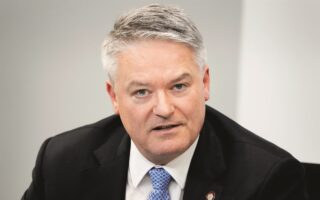Government should ‘stick to the budget targets’
The head of the IMF’s European Department urges Greece to keep in place targeted support measures if it wants to keep the economy on track

The Greek government, as well as the one that will emerge after the spring elections, must stick to the goal of returning to primary surpluses, make a “prudent” adjustment of minimum wage levels, while keeping in place targeted and growth-friendly support measures if it wants to keep the economy on track, the head of the International Monetary Fund’s European Department, Alfred Kammer, has told Kathimerini. The policy mix, he said, should also include further reforms in the labor market and other areas, proper use of EU recovery funds, and further strengthening of bank balance sheets.
In the same interview, which was published in the newspaper’s special New Year edition on business and the economy, Kammer forecast that Greece’s debt will decline “sharply” due to high inflation and solid growth. However, asked whether Greece can expect to return to investment grade in 2023, the IMF official said that “fiscal policy needs to give confidence that debt is sustainable not only over the next decade but also in the long run.” On a European level, Kammer argued that fiscal consolidation should proceed in 2023, while defending the ECB decision to tighten its monetary policy stance. He opposed tax cuts as a way of containing rising prices, adding that any new expenditure should be offset by appropriate countermeasures.
You mentioned during the annual meetings of the IMF in October that the prospects for the European economy have darkened, because of the war in Ukraine, and expressed concerns about the possibility of an even lower-than-projected GDP growth of 0.6% and higher inflation than 6%. Do you still see the same risks? Is Europe – or some European countries – heading toward a recession in 2023?
The outlook and risks remain similar, with many parts of Europe expected to be entering technical recessions while inflation will remain high and persistent. At the same time, the driving forces of the outlook have shifted a bit lately, in opposing directions. On the upside, domestic demand momentum in Europe remained strong in the third quarter of 2022, contributing to better-than-expected GDP growth outturns, for example in Germany. Further, gas prices have declined, and governments have expanded energy relief to households and firms, both of which should support growth this winter and in [the rest of] 2023. On the downside, however, financial conditions have tightened significantly since our October forecasts, pushing consumer and business confidence to very weak levels. This tightening partly reflects the persistence of inflation, which has moved central banks, including the ECB, to signal further policy tightening ahead. Higher and more persistent inflation is also eroding household purchasing power and private consumption. All these factors will weigh on domestic demand and growth in 2023. Meanwhile, while inflation should decline steadily, it will likely remain above central bank targets by the end of 2023. Russia’s war in Ukraine will keep uncertainty high, with predominant risks to the downside for growth and to the upside for inflation. We will be revising our forecasts in January, so please stay tuned for an update.
Are you concerned that the further tightening of monetary policy by the ECB, which you are encouraging, could in fact lead to a recession, without taming inflation?
With inflation continuing to surprise on the upside and the passthrough from energy and food to core inflation further increasing, it is important for the ECB to keep inflation expectations and nominal wage growth in check to deliver the 2-percent inflation target over the medium term. This will likely require further rate hikes and a shift to a contractionary monetary policy stance, unless weaker growth and labor market prospects materially reduced medium-term inflation prospects. Of course, because the inflation outlook is so uncertain, future policy rate decisions should be based on the latest developments and forecasts, allowing the ECB to adjust course as needed.
Do you see the risk of a new debt crisis for highly indebted countries, like Greece?
No. Under our projections, we do not see a risk of a debt crisis in Europe. Most EU countries have emerged from the pandemic with higher debt and deficits, and the ongoing energy and cost-of-living crises are weighing on public finances. Moreover, while lower real interest rates – driven largely by higher inflation – initially helped many countries to reduce debt ratios and the burden of their debt service, tighter financial conditions are now pushing up debt service costs. However, with prudent macroeconomic policies, this is manageable. What does this mean? Countries with high debt ratios will be in the greatest need of fiscal consolidation, both to ensure the sustainability of public finances, and to build the space needed to provide countercyclical support in the event of a future economic downturn. But this is an endeavor that requires many years of well-balanced and sustained fiscal policy, aimed at gradually improving overall fiscal positions. A robust European fiscal framework and credible medium-term fiscal plans are important elements in delivering this outcome. With regard to Greece, while debt is high, there are mitigating factors: Most of the debt is in official hands, with long grace periods and maturities and low fixed interest rates. As a result, given high inflation and solid growth, the debt ratio is in fact projected to decline sharply this year and over the medium term, and financing needs remain manageable also in light of Greece’s large cash buffer.
There is obviously a conflict between monetary and fiscal policies in Europe, since governments are trying to support their citizens by handing out money, whereas the ECB is trying to sustain demand. How should this conflict be resolved?
‘We suggest that the government limits the growth in government spending and broadens the tax base, which would create room to reduce tax rates’
European policy makers are facing the difficult task of bringing down inflation, supporting vulnerable households through the energy crisis, and avoiding deep recessions. With coordinated, consistent and well-designed policies, this can be done. Central banks should focus on bringing down inflation to target, and the ECB is appropriately tightening its monetary policy stance. Governments across Europe should be making sure that their policy responses to high energy prices and the erosion of purchasing power take the form of temporary and targeted subsidies that also encourage energy savings, such as lump-sum transfers to low-income households, rather than price caps and freezes. Fiscal consolidation should proceed in 2023, so new expenditure should be offset by cuts to lower-priority spending or increases in tax revenue. Finally, and importantly, structural reforms that ease supply constraints in energy and labor markets could both increase growth and ease price pressures over the medium term.
How long do you expect inflation to persist in Europe? Are you concerned it might become permanent? How can we avoid such a risk?
We do not expect inflation to become permanent. Rising energy and food prices have accounted for about two thirds of the inflation surge in Europe, on average. Therefore, with the recent stabilization or – in the case of gas – decline in commodity prices, inflation should fall steadily [this] year. However, we project that inflation will still be above central bank targets by the end of 2023. One of the reasons is that inflation pressures have progressively become more broad-based, reflecting – as our Regional Economic Outlook for Europe showed in October – the increasing role that rising input and labor shortages have been playing in the recent inflation surge. So, there is a risk that high inflation could become more entrenched. That risk would get bigger if firms and workers started expecting high inflation in the future and decided to set their prices and wages accordingly. So far, the pickup in wage growth has been moderate, at least in Western Europe. Higher wages are not a concern as such, of course, but what needs to be avoided is a sharp acceleration that would trigger an adverse feedback loop between prices and wages. Such a “price-wage spiral” would make inflation even more persistent, require even more aggressive monetary policy tightening, and would result in weaker activity and job losses.
What is your opinion on the European Commission’s proposal for the new Stability Pact? Does it address the current challenges? If you were to suggest one change or addition to it, what would that be?
The European Commission’s economic governance reform proposal is an important and welcome step in the process of agreeing on a reformed EU fiscal framework. The proposal addresses well-known problems with the current framework. As consensus is built among member-states, important technical and institutional details will need to be fleshed out, including the potential impact of the required debt reduction for high-risk countries, and the effectiveness of using net primary expenditure as an operational instrument. The result must be a strong and effective framework that delivers fiscal policies for a prosperous, stable and inclusive European economy. One change we would suggest is to add a central fiscal capacity to strengthen the EU’s ability to use coordinated fiscal policy for macroeconomic stabilization and provide common public goods, such as greenhouse gas emission reductions.
You projected a sharp decline in GDP growth for Greece in 2023, but not a recession. What policies should be adopted for a sustainable and higher growth rate in the medium and long term?
We suggest that the government limits the growth in government spending and broadens the tax base, which would create room to reduce tax rates. While the authorities have achieved a rapid reduction of nonperforming loans in the major banks, efforts to further enhance financial resilience and reduce distressed debt would allow greater credit provision to the economy. In addition, the National Recovery and Resilience Plan, which is supported by Next GenerationEU (NGEU) funds, is a key opportunity to cement past reform achievements; address remaining structural bottlenecks, including in the labor market; raise investment and growth potential; and ensure sustainable, job-rich, and greener growth.
Are you concerned that the elections in 2023 could derail fiscal consolidation?
We certainly hope that this and the next government will stick to the targets in the 2023 budget that was submitted to the Parliament and that efforts continue to improve the fiscal mix so that government support is well targeted and growth friendly. Likewise, it will be important that [the] minimum wage adjustment is prudent, striking the right balance between supporting purchasing power and avoiding derailing the employment recovery or fueling wage-price pressures.
Can Greece expect to reach investment grade in 2023?
This is a question for the rating agencies, but I would expect that one important consideration here is that fiscal policy needs to give confidence that debt is sustainable not only over the next decade but also in the long run, when the concessional official debt is gradually replaced with market financing. In addition, as mentioned, further strengthening bank balance sheets and effective execution of NGEU resources would contribute to achieving this goal.





